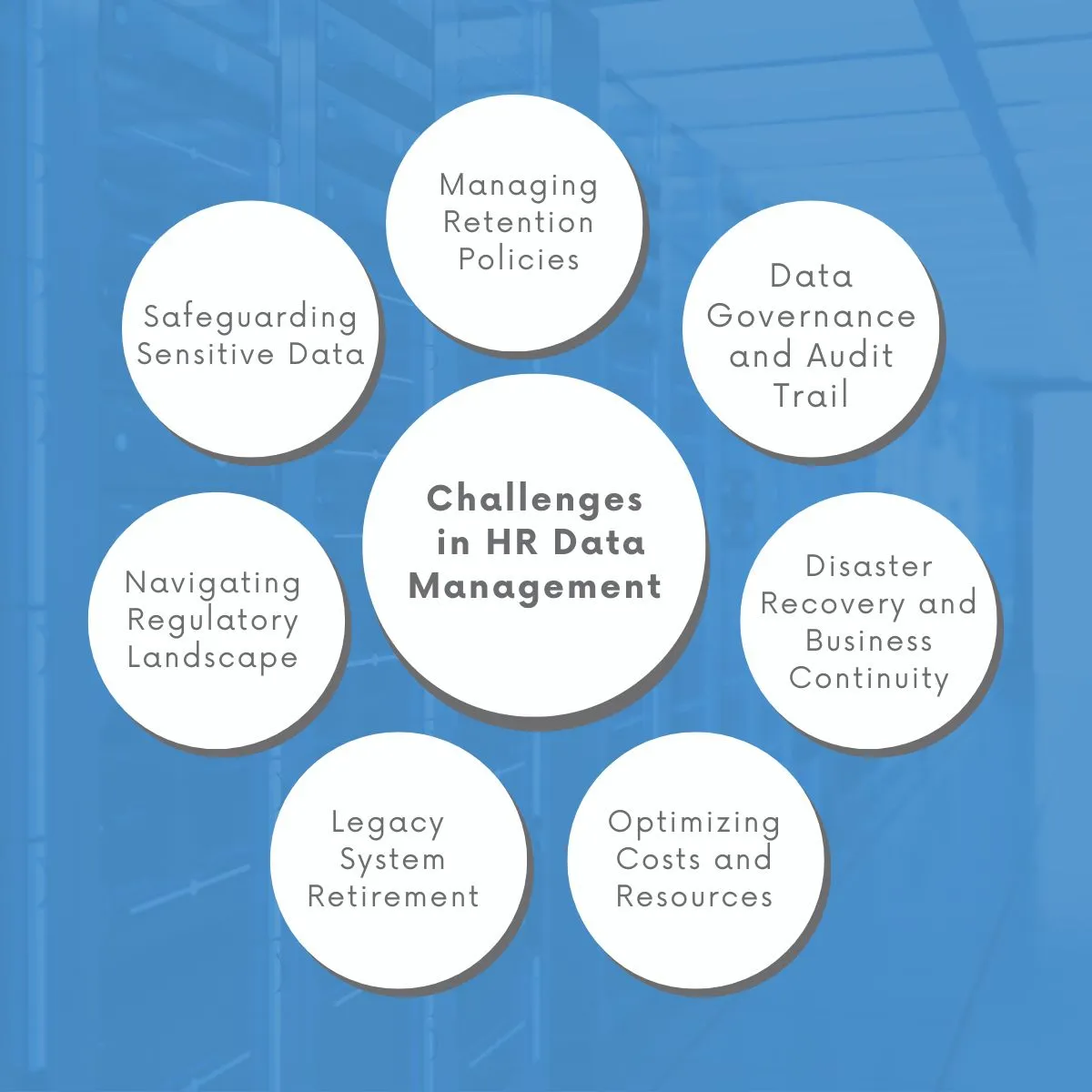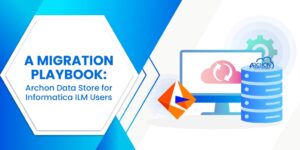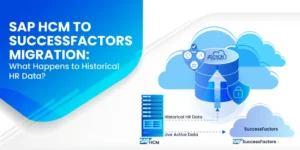Organizations accumulate vast amounts of information, and the effective management of sensitive data is crucial for compliance, security, and operational efficiency. However, legacy HR systems are often subject to challenges in handling the growing volume and complexity of data; in turn, this makes secure retrieval, analysis, and storage a daunting task. This is where data migration and archival play a vital role.
Archiving human resource systems within the financial industry (such as HR systems for banks) poses several challenges due to the sensitive nature of the data involved, stringent compliance requirements, and the need to maintain accessibility and integrity. In this blog, we have combined the few common challenges faced in HR data management.
Obstacles in HR data management
- Safeguarding Sensitive Data: Banking HR systems hold a wealth of sensitive information, including employee records, financial data, and Social Security numbers. Robust security measures are crucial when archiving these systems to prevent threats like unauthorized access, data breaches, and leaks.
- Navigating Regulatory Landscape: The banking industry operates under a complex web of regulations imposed by authorities such as the General Data Protection Regulation (GDPR) and the California Consumer Privacy Act (CCPA) along with industry-specific regulations like Basel III and the Sarbanes-Oxley Act (SOX). Each is associated with specific data privacy, retention, and legal compliance requirements. While archiving HR data, it’s essential to adhere to these regulations for ongoing compliance.
- Managing Retention Policies: HR data in banking needs to be retained for specific periods as dictated by regulations and internal policies. This includes employee records, financial transactions, and compliance documents. Effective retention policies are vital for data archiving, and should accordingly ensure the protection of data integrity, federated accessibility, and compliance with regulations & business needs.
- Data Governance and Audit Trail: Effective data governance practices are essential when archiving HR data in banking. This ensures data quality, integrity, and consistency. Implementing audit mechanisms that track changes to archived data fosters accountability, traceability, and regulatory compliance.
- Bridging Legacy Systems: Many banks have legacy HR systems with outdated technology, proprietary formats, and limited compatibility with modern solutions. Archiving such systems requires careful planning and integration with modern archival solutions to facilitate seamless data migration, long-term accessibility, and future compatibility.
- Preserving Data Integrity During Migration: Data migration is a core aspect of HR system archiving. It involves moving data from legacy systems to archival repositories while ensuring the integrity, relationships, and historical context of the information are preserved. It can be challenging to migrate with data integrity intact due to concerns like data format conversion, data cleansing, metadata preservation, and maintaining data consistency across systems.
- Balancing Accessibility and Security: Archived HR data needs to be accessible for legitimate purposes like compliance audits, legal inquiries, and historical reporting. However, maintaining robust security is equally important. Archival solutions should offer efficient search and retrieval functionalities alongside access controls that ensure only authorized users can access archived data when needed.
- Optimizing Costs and Resources: Archiving HR data for banking customers requires investments in infrastructure, storage, software licenses, and ongoing maintenance. Effective cost management, resource allocation, and scalability planning are essential to ensure cost-effective archival solutions that meet business needs.
- Disaster Recovery and Business Continuity: Disaster recovery and business continuity measures are crucial for archival solutions. This ensures data availability, resilience, and the continuity of operations even during system failures, natural disasters, or cyberattacks.
- Selecting the Right Vendor Partner for HR data management: Choosing the right vendor for archival solutions is critical. Look for vendors with expertise in banking industry compliance, data security, and relevant regulatory standards. Ensure ongoing vendor support, service-level agreements (SLAs), and maintenance services for the successful implementation and operation of archival systems.
Let’s delve into a narrative that explores a successful project, illustrating the importance of migrating and archiving data while shedding light on the necessity of secure storage systems.
Project Overview: Migrating from PeopleSoft
A leading financial institution faced the challenge of managing 6 TB of HR data residing in its legacy PeopleSoft system that was nearing its end-of-life. Data security and compliance were major concerns. In response, the institution partnered with Platform 3 Solutions to migrate its historical data from PeopleSoft HRMS, totaling 6 TB and residing on an Oracle database, including both structured and unstructured content. A new UI was developed in the target system to facilitate day-to-day HR activities, ensuring a seamless transition.
Navigating Project Challenges in HR data management
To migrate from PeopleSoft HRMS, Platform 3 Solutions used one of our state-of-the-art data integration tool Archon ETL. When extracting and ingesting legacy data, Archon ETL ensures that the system stores data correctly; allowing search, analysis, and display of accurate data.
However, we encountered several challenges during the migration process. These include:
- Aggressive Timelines: With the legacy system license expiring soon, our client required a swift migration. We leveraged the capabilities of Archon ETL, our powerful data migration tool, to accelerate the process and complete the migration within four weeks.
- Infrastructure Limitations: Both applications shared the same infrastructure, demanding careful resource management and project scheduling. Through meticulous planning and collaboration, we successfully navigated these constraints and delivered both projects on time.
- Data Integrity Issues: Identical filenames for BLOB files (large binary objects) posed the risk of data overwriting. Our solution involved appending unique identifiers to each extracted file to ensure data accuracy and integrity.
- Split BLOB Files: Large BLOBs split into multiple files due to database size limits created retrieval challenges. We implemented a solution within Archon ETL to merge these fragments into complete files.
- End-to-End Extraction: Strict data security requirements mandated a seamless, single-step extraction and ingestion process. Archon ETL’s metadata-driven approach ensured data security and compliance requirements were met throughout the migration.
- Tool Adoption: Users familiar with PeopleSoft initially struggled to adapt to the new interface. We conducted workshops and provided demos to bridge the gap, enabling users to grasp the tool’s capabilities and provide valuable business requirements.

Archon ETL for effective HR data management
The Archon ETL team at Platform 3 actively harnessed the software’s capabilities and opted for a cluster model installation to speed up the migration process. They designed specific solutions within Archon ETL to tackle the challenges of similar BLOB filenames and split BLOB files. An end-to-end extraction and ingestion process was implemented to ensure compliance with data security regulations.
Benefits of Successful Data Migration
The successful migration delivered significant benefits for our client:
- Efficient Data Migration: 6 TB of structured and unstructured data was migrated swiftly using Archon ETL within a remarkable four-week timeframe.
- Enhanced Query Performance: Complex queries behind user screens were optimized through materialized views and indexing, reducing retrieval times from 25 minutes to under 15 seconds for one crucial query—this significantly improved system performance and user satisfaction.
- Streamlined Communication: The project fostered better collaboration and communication within the client’s team, enhancing their understanding of the archival process and data management best practices.
- Training and Knowledge Sharing: The client teams received training and knowledge-sharing sessions, facilitating knowledge transfer between team members, including extensive documentation.
Importance of Secure Data Migration
Secure data migration ensures the confidentiality, integrity, and availability of sensitive information like employee names, addresses, and Social Security Numbers throughout the transition.
- Legal Obligations and Compliance: HR departments navigate a complex web of data retention and legal hold regulations. Secure data migration safeguards compliance with these regulations, minimizing the risk of hefty fines and reputational damage associated with data breaches.
- Cost-Effective Storage and Archiving: Implementing secure data migration unlocks the potential for cost-effective storage and unified archival systems. Organizations can significantly reduce storage costs associated with maintaining legacy systems by leveraging efficient storage solutions while maintaining data integrity. Additionally, unified archives streamline the retrieval and management of HR records, fostering operational efficiency.
By prioritizing secure data practices, organizations can ensure compliance with regulations, protect employee privacy, and unlock the cost-saving benefits of modern storage solutions.
The overall results
This success story underscores the transformative power of strategic HR data management through migration and archival in banking HRMS. It not only met aggressive timelines but also addressed infrastructure limitations and user adaptation challenges. The enhanced user experience, streamlined communication, and improved knowledge of archival processes signify a successful integration of modern technology into traditional HR systems.
Our client gained a compliant and user-friendly solution for managing their historical information by securely archiving HR data. This ensured data security and regulatory adherence unlocked valuable insights and streamlined HR processes.
If you face similar challenges with managing your HR data, consider migrating to a secure storage solution.
Contact Platform 3 Solutions today to learn more about how you can achieve your HR data management goals—we’re here to help.
Platform 3 Solutions is a global leader in end-to-end legacy application migration and retirement solutions. Platform 3 empowers secure and seamless transitions of data and applications, eliminates technology debt, and delivers the ROI to invest in technology modernization.



